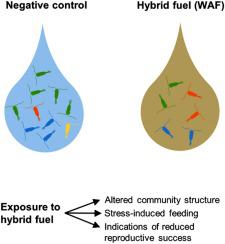Aquatic Toxicology ( IF 4.5 ) Pub Date : 2020-08-12 , DOI: 10.1016/j.aquatox.2020.105592 Christina Jönander 1 , Ingela Dahllöf 1

|
International shipping is responsible for the release of numerous contaminants to the air and the marine environment. In order to reduce airborne emissions, a global 0.5 % sulphur limit for marine fuels was implemented in January 2020. Recently, a new generation of so-called hybrid fuels that meet these new requirements have appeared on the market. Studies have shown that these fuels have physical properties that make conventional clean-up methods difficult, but few have studied their effects on marine life. We conducted short and long-term microcosm experiments with natural mesozooplankton communities exposed to the water accommodated fractions (WAFs) of the hybrid fuel RMD80 (0.1 % sulphur) and a Marine Gas Oil (MGO). We compared the toxicity of both fuel types in 48h short-term exposures, and studied the effects of the hybrid fuel on community structure over two generations in a 28-day experiment.
The F0 generation was exposed for eight days and the F1 generation was raised for 22 days without exposure. GC–MS and GC–FID analysis of the WAFs revealed that the hybrid fuel was dominated by a mixture of volatile organic compounds (VOCs) and poly aromatic hydrocarbons (PAHs), whereas the MGO was mainly composed of VOCs. We observed significant short-term effects on copepod egg production from exposure to 25 % hybrid fuel WAF, but no effects from the MGO WAF at equivalent WAF dilution. In the long-term experiment with RMD80, the feeding rate was initially increased after exposure to 0.5–1.1 % hybrid fuel WAF, but this did not increase the copepod egg production. Significant change in community structure was observed after eight days in the F0 community at 0.5–3.3 % WAF. Indications of further alterations in species abundances was observed in the F1 community. Our results demonstrate that the MGO is a less toxic low-sulphur alternative to the hybrid fuel for marine zooplankton, and that a hybrid fuel spill could result in altered diversity of future generations of copepod communities.
中文翻译:

低硫燃料对海洋浮游动物群落的短期和长期影响。
国际运输负责将大量污染物释放到空气和海洋环境中。为了减少空气中的排放物,2020年1月对船用燃料实施了全球0.5%的硫限制。最近,满足这些新要求的新一代所谓的混合燃料出现在市场上。研究表明,这些燃料的物理特性使传统的清理方法变得困难,但很少研究其对海洋生物的影响。我们对暴露于混合燃料RMD80(0.1%硫)和船用瓦斯油(MGO)的水份(WAF)中的天然中型浮游生物群落进行了短期和长期的微观实验。我们在48小时的短期暴露中比较了两种燃料的毒性,
F0代暴露了八天,而F1代则暴露了22天而没有暴露。对WAF的GC-MS和GC-FID分析表明,混合燃料主要由挥发性有机化合物(VOC)和多芳烃(PAH)的混合物组成,而MGO主要由VOC组成。我们观察到暴露于25%混合燃料WAF对co足类卵的生产具有显着的短期影响,但当WAF稀释度相同时,MGO WAF则没有影响。在RMD80的长期实验中,在接触0.5–1.1%的混合燃料WAF之后,最初的进食速率有所提高,但这并未提高increase足类卵的产量。在F0社区中,WAF为0.5–3.3%时,在八天后观察到社区结构发生了显着变化。在F1社区中观察到物种丰度进一步变化的迹象。我们的结果表明,MGO是海洋浮游生物混合燃料的低毒低硫替代品,混合燃料泄漏可能会导致co足类群落后代的多样性发生变化。


























 京公网安备 11010802027423号
京公网安备 11010802027423号